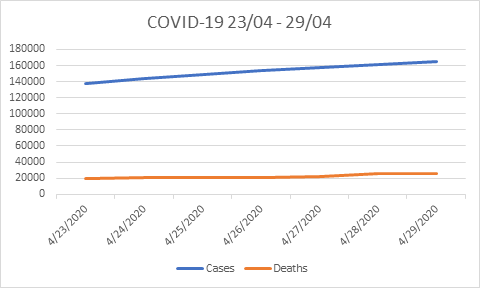This is the sixth of a series of bulletins produced by ISE to update members on key data and policy on Covid-19. This bulletin just covers the period 23/04/2020-29/04/2020.
You can access all of the Covid-19 bulletins on the ISE website.
The week in Covid-19

Data taken from Wikipedia.
- Hospital deaths passed 20,000 during this week.
- It is looking like the UK is over the peak of Covid-19 in terms of infections and deaths. But, the plateau could go on for a number of weeks.
- More detailed international statistics can be found on the John Hopkins University Covid-19 dashboard.
Politics, policy and government
- Criticism of the way that the government has handled the crisis has continued. Philip Stephens summarises the discussion in his piece in The Financial Times.
- The public’s confidence in the government’s handling of the crisis has been falling.
- The Tony Blair Institute publish their plan for exiting lockdown. They recommend a twin-track approach to containing the disease and shielding the vulnerable and build on lessons from other countries.
- Ministers meet with businesses and unions to plan a route out of lockdown.
Education
- Lessons from Denmark and China show that when school’s go back after lockdown teaching is far from normal.
- It is unclear whether school and college students will be able to choose to take exams in September as was originally promised by the government.
- UCAS research suggests that while most students intend to stick with their existing university choices for September a substantial minority are considering making changes.
- The higher education sector is expected a substantial drop in student numbers and has been sounding the alarm about its financial viability following the Covid-19 crisis. However, the Treasury is resisting calls for a bailout of universities.
Economy
- New data published by the Office for National Statistics on the economic impact of Covid-19. It shows that 94% of businesses are seeking to access support from government, around 27% of the working population have been furloughed and 49% of those working were working from home.
- The government has made interest free loans of up to £50,000 available to small-businesses to support them to deal with Covid-19.
- Andy Haldane (Chief Economist of the Bank of England) argues that we need to recognise and support the voluntary work that has gone on during the pandemic and make use of it during reconstruction.
Labour market
- Employers argue that wage subsidies need to be extended if the furlough scheme is not to become a ‘waiting room for redundancies’.
- Johnathan Portes argues that the negative impact of Covid-19 on immigration will cause major problems for the UK economy.
The student labour market
- The Resolution Foundation argue that young people are experiencing the worst impacts of the crisis and are at risk of long-term career damage from Covid-19.
- HEPI research finds that university students are feeling anxious about entering the labour market.
- Concerns about the impact of the crisis on young people continue to grow. The Youth Employment Group has been formed to try and address this and set out their stall in an article in The Independent. Tristram Hooley proposes some policy options to mitigate the impact on young people.
- Charlie Ball (HECSU) offers his digest of facts on the current graduate labour market.
Student recruitment
- The ISE are currently surveying employers on how Covid-19 is impacting on their student recruitment and development activities.
- Covid-19: How ISE suppliers are supporting our industry. (blog from Tristram Hooley – also view the webinar)
- Connecting students and employers in a virtual world (new paper from GradConsult and Handshake).
Employer insights
The following insights are based on ISE’s interactions with employers during the period covered by this briefing.
- Qualifications. Firms are concerned about how academic qualifications (at school and university) are going to be awarded and on what timescale. Even if everything goes according to plan there are likely to be increased issues with appeals and mitigating circumstances.
Summer interns. Some firms are cancelling summer interns. Other delaying start dates or moving the internship online. - New starters. Many firms are still in the process of making decisions about the number of new hires they are going to induct in August/September. Some have decided to go ahead and are generally planning for online induction for summer or autumn starters. Others are looking to delay start dates until January. Most recruitment that is not already in process has been paused, but, so far, no one is talking about reneging on offers.
- Compensation. Some employers report that new hires’ salaries are likely to be frozen or even cut in comparison with last year.
- Virtual induction. Firms emphasised the importance of ensuring that online/virtual inductions were not just a transmission information about the firm. They also need to engage new hires with each other and support them to build connections in the firm. Key to this is involving line managers.
- Placement students. Most firms have been able to keep existing placement students on, but were keen to clarify expectations with universities about what the requirements were for current and future placement students.
- Existing hires. In some cases firms are reporting furloughing existing staff and considering redundancies and pay freezes or cuts.
- New recruitment campaign. Most firms report that they are unlikely to be back on campus in the autumn. This would be addressed by shifting to more online recruitment and marketing approaches. Some firms feel that with a sufficiently imaginative approach this shift might be permanent. Others are less sure and feel that it is important to keep some face to face elements if possible. An important area of concern is around diversity and inclusion. Some firms fear that new solely online recruitment processes may disadvantage some candidates and it is not clear how best to address this.
Was this article helpful?
YesNo


0 Comments